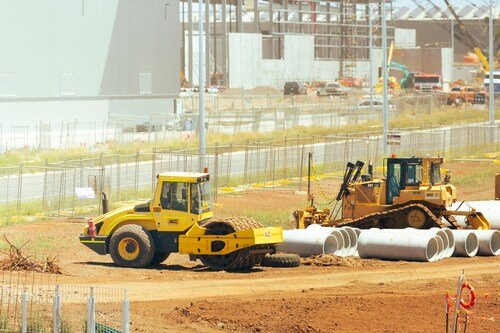In construction, efficiency and precision are paramount. This is why high-end equipment stands as the foundation of progress. From towering skyscrapers to intricate infrastructure projects, the utilisation of heavy machinery has become synonymous with modern construction practices. This article looks into the numerous advantages that heavy machinery brings to the table. It focuses on how these tools revolutionise the way we build and shape the world around us.
Enhancing Efficiency and Productivity
Heavy equipment has revolutionised the construction industry, providing significant benefits that enhance efficiency and productivity on job sites. The use of advanced machinery like excavators, bulldozers, and cranes has drastically reduced the time and labour required for large-scale projects. By leveraging them, construction companies can complete tasks that would otherwise take weeks or months in a matter of days. This efficiency translates into cost savings and allows for more projects to be completed within shorter timeframes.
Ensuring Precision and Accuracy
One of the primary advantages of such equipment is the precision and accuracy it brings to construction tasks. Modern machinery is equipped with advanced technology, such as GPS and laser-guided systems. This ensures that tasks are carried out with pinpoint accuracy. This level of precision is crucial for tasks like grading, paving, and trenching, where even minor errors can lead to significant issues. By utilising such equipment, construction professionals can achieve higher standards of quality and reduce the likelihood of costly mistakes.
Improving Safety on Job Sites
Safety is a top priority in the construction industry, and these play a crucial role in enhancing job site safety. The use of machinery reduces the need for manual labour, which in turn minimises the risk of injuries related to repetitive tasks and heavy lifting. Additionally, such equipment is designed with safety features such as rollover protection systems, advanced braking systems, and operator cabs that protect workers from hazardous conditions. These features help create a safer working environment, reducing the incidence of accidents and promoting the well-being of construction workers.
Facilitating Versatility and Adaptability
Heavy equipment offers a level of versatility and adaptability that is invaluable in the construction industry. Different types of machinery can be used for a wide range of tasks – from excavation and demolition to material handling and road construction. This versatility allows construction companies to tackle various projects without the need for specialised equipment for each task. Also, many pieces can be equipped with interchangeable attachments. This helps in enhancing their functionality and allowing for quick adaptation to different job requirements.
Cost-Effectiveness and Long-Term Savings
Investing in such equipment can lead to significant cost-effectiveness and long-term savings for construction companies. While the initial cost of purchasing or leasing machinery can be substantial, the benefits of increased productivity, reduced labour costs, and improved project timelines often outweigh these expenses. Moreover, it is built to be durable and withstand rigorous use. This means it can provide reliable service for many years with proper maintenance. This longevity translates into long-term savings, making it a wise investment for construction businesses.
Supporting Infrastructure Development
High-end equipment is integral to the development and maintenance of infrastructure, which is vital for economic growth and societal well-being. Machinery such as excavators, loaders, and graders are essential for constructing roads, bridges, airports, and other critical infrastructure. These projects not only improve connectivity and accessibility but also create jobs and stimulate economic activity. The use of such equipment ensures that infrastructure projects are completed efficiently and to a high standard, supporting the development of robust and reliable infrastructure systems.The benefits of heavy equipment in the construction industry are manifold, from enhancing efficiency and precision to improving safety and environmental sustainability. By investing in and utilising advanced machinery, construction companies can achieve significant cost savings, boost their competitive advantage, and contribute to infrastructure development. This strategic use is essential for meeting the demands of modern construction projects and ensuring the continued growth and success of the industry.








